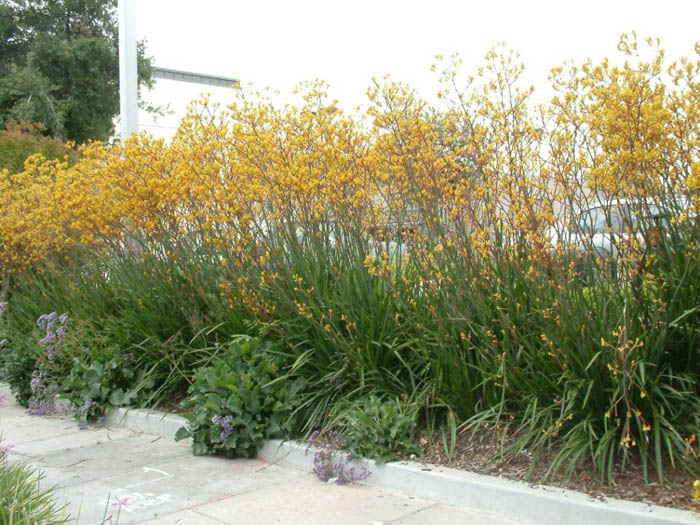Anigozanthos flavidus 'Bush Dawn'
Bush Dawn Kangaroo Paw

Description
This evergreen perennial forms clumps to 1 to 2 feet wide with bright green stapped shaped leaves to 4 feet tall. From spring until fall emerge the bright yellow tubular flower buds that flare open at tips like a paw.
Maintenance Tips
Anigozanthos flavidus ‘Bush Dawn’ is one of the many medium-sized varieties of the Kangaroo Paws. It is an evergreen perennial with a strappy leaf structure and flower stalks that can rise 4' or more into the air. This is a very low-maintenance plant that only requires deadheading the spent blooms to keep it looking and performing its best. When the bright yellow flower starts to fade to a wheat color, that would be the time for cleaning up the plant. The old flower stalks will not re-bloom so they should be cut back completely down inside of the foliage. New flower stalks will emerge throughout the spring and summer. Along the coast or in humid climates, this plant is susceptible to some fungal diseases. Plant them in well-drained soil in areas that are on the dry side to help avoid such problems. They are also very attractive to snails and slugs, so it is best to avoid conditions where these pests thrive.
Plant Type
Perennial
Height Range
3-6'
Flower Color
Yellow
Flower Season
Spring, Summer, Fall
Leaf Color
Green, Dark Green
Bark Color
n/a
Fruit Color
n/a
Fruit Season
n/a
Sun
Full
Water
Low
Growth Rate
Fast
Soil Type
Sandy, Loam, Rocky
Soil Condition
Average, Well-drained, Dry
Soil pH
Neutral
Adverse Factors
n/a
Design Styles
Mediterranean, Ranch, Tropical
Accenting Features
Fall Color, Showy Flowers, Specimen, Unusual Foliage
Seasonal Interest
Spring, Summer, Fall
Location Uses
Entry, Perennial Border, Patio, Parking Lot, Raised Planter, Swimming Pool, With Rocks
Special Uses
Container, Cut Flowers, Mass Planting
Attracts Wildlife
n/a
Water Saving Tip:
Water between sunset and sunrise when temperatures and wind are the lowest.